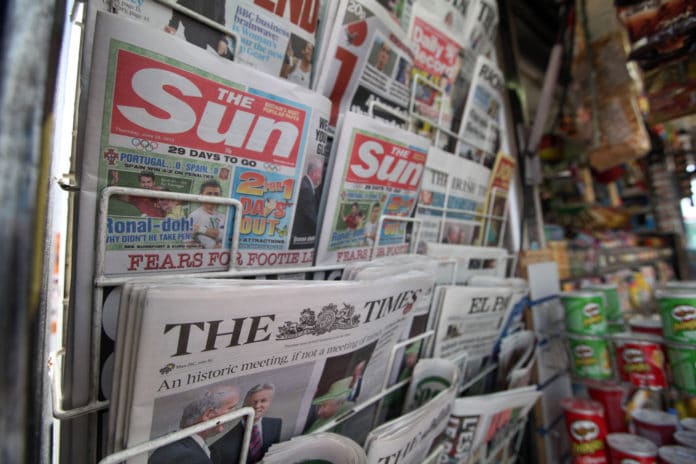A British tabloid headline about the industry itself might read something like this: “Shock Fleet Street Breakup: Papers Jilted for Digital Mistress.”
Britain’s daily press — with its saucy headlines and coverage that ranges from lurid exposes of politicians’ peccadilloes to sober analyses of their policies — has long weathered the digital onslaught that has decimated the business elsewhere. Two decades into the web era, Britain supports at least 10 print titles with national reach.
The day of reckoning is at hand as digital revenue fails to make up for declines in print advertising, and cellphones — with even lower ad rates — become the primary device for many readers. Fleet Street, the industry’s London home until most papers moved away in the 1980s, is cutting jobs and scrambling to shore up advertising and circulation.
The Independent in March shut its print edition and adopted a digital-only strategy. The Telegraph is closing its office canteen. The Guardian is cutting 250 jobs as it aims to reduce costs by 20 percent. Trinity Mirror this spring shuttered a new paper after less than three months. Even the Daily Mail, which has maintained a strong print readership while building the world’s biggest English-language news website, is warning of weakness in advertising.
“I’ve had a dread of this happening,” says David Banks, former editor of the Mirror and a former managing editor at the New York Post. “The house of cards is tumbling.”
Britain remains the fifth-largest newspaper market, generating $8 billion a year in revenue. And the closure of the Independent’s print edition, along with interest in the June 23 Brexit referendum on U.K. membership in the European Union, has given some titles a modest boost. The Guardian, Telegraph and Times posted circulation gains of at least 2.9 percent in April.
But the long-term trends are dire as digital revenue, while rising, can’t take up the slack. Just 62 percent of British adults read a newspaper at least once a week in 2015, down from 70 percent in 2011, according to the World Association of Newspapers and News Publishers. Print ad sales at U.K. newspapers last year dropped to 1.7 billion pounds ($2.4 billion) from 4.2 billion pounds in 2005, media-buying agency ZenithOptimedia says. Digital ads last year totaled 356 million pounds, leaving a shortfall of more than 2 billion pounds.
“Everyone was waiting for the moment when digital ads were going to offset the drop in print,” says Alex De Groote, media analyst at Peel Hunt in London. “The tipping point didn’t come through, and it’s not going to.”
The Guardian, for instance, invested heavily in digital operations but remained free online under former editor Alan Rusbridger. While the title ranks second among English-language news sites, with 39 million unique visitors in April versus the Daily Mail’s 50 million, according to researcher ComScore, ad revenue hasn’t kept pace with print declines. The Guardian’s circulation has shrunk by more than half over the past decade, to 169,000 in April.
Guardian Media Group, which publishes the Guardian and the Sunday-only Observer, says it expects an operating loss of 53 million pounds in the 12 months ended in March. David Pemsel, the group’s chief executive officer, says he’s aiming to break even within three years with a renewed focus on digital revenue from sources other than advertising.
“The last 12 months have been a genuine wake-up call for the industry,” Pemsel says.
Publishers have tried all manner of new ideas to keep readers from defecting. The Telegraph gives out free bottles of water with a purchase of the paper at WH Smith convenience stores. Trinity Mirror, owner of the Mirror, in February launched New Day, a tabloid aimed at attracting women who had deserted newspapers. The title featured an upbeat editorial line with stories about families, children, and relationships and largely skirted sports and crime coverage. The marketing slogan, “Life is short, live it well,” turned out to be prophetic. The paper closed after less than three months.
News Corp., which publishes the staid Times and the Sun, a tabloid stuffed with celebrity tittle-tattle and sports news, has had mixed results with fees for online content. The Times started charging in 2010 and today it has more than 170,000 paid digital subscribers. The Sun, by contrast, in 2015 dropped its paywall after two years. In an effort to tap into Britons’ love of gambling and sports, it plans to add an online betting service, following the introduction of a fantasy soccer game called “Dream Team.”
“Instead of just thinking about the Sun as a newspaper, you think about it as a brand,” says David Dinsmore, chief operating officer of News U.K.
Trinity Mirror has approached other newspaper publishers about merging their ad sales operations to gain more leverage with media buyers, trade publication Campaign reported in May. Trinity Mirror declined to comment.
Even the Daily Mail, which has bucked the industry by minimizing print declines while attracting online readers with a steady diet of Kardashians, Kate Moss and Christiano Ronaldo, is getting hit. Shares of its owner, Daily Mail & General Trust Plc, plunged in May when the company said print ad revenue fell 13 percent in the latest six months.
The industry’s crisis has upset a delicate political equilibrium on Fleet Street, says Tim Luckhurst, journalism professor at the University of Kent and former editor of the Scotsman newspaper. Unlike the U.S. press, which strives for impartiality, British papers have traditionally leaned left or right.
The demise of the Independent’s print edition and the prospect of additional casualties could “diminish the diversity and plurality of national publications on which Britain has depended since the late 19th century,” Luckhurst says. “In a democratic firmament in which you expect newspapers to be partisan, that balance of opinion really matters.”






